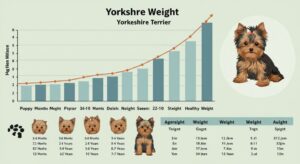Understanding your Yorkie’s growth and weight milestones is essential for keeping your furry friend healthy and thriving. Yorkies are a small but mighty breed, and tracking their weight by age can help you catch any signs of health issues early. In this guide, we’ll break down everything you need to know about Yorkie weight by age, including a helpful growth chart and tips for keeping your pup at an ideal weight.
Table of Contents
- Yorkie Growth Stages
- Yorkie Weight by Age Chart
- Factors Affecting Yorkie Weight
- How to Keep Your Yorkie at a Healthy Weight
- When to See a Vet About Your Yorkie’s Weight
- Conclusion
Yorkie Growth Stages

Yorkshire Terriers, commonly known as Yorkies, go through several distinct growth stages. These small dogs typically reach their full adult size faster than larger breeds. Here’s a brief overview of the key stages:
- Newborn to 8 Weeks: Rapid weight gain; dependent on mother’s milk.
- 8 Weeks to 6 Months: Significant growth and development; weaning and starting puppy food.
- 6 to 12 Months: Slower growth as Yorkie nears adult size.
- 12 Months and Beyond: Considered an adult; weight should stabilize.
Yorkie Weight by Age Chart
Below is a general chart that outlines typical Yorkie weight by age. Remember that every dog is unique, and small variations are normal.
| Age | Average Weight (lbs) |
|---|---|
| Birth | 2.5 – 5 oz |
| 1 Month | 0.5 – 1.0 lbs |
| 2 Months | 1.0 – 1.6 lbs |
| 3 Months | 1.4 – 2.4 lbs |
| 4 Months | 1.8 – 3.0 lbs |
| 5 Months | 2.2 – 3.5 lbs |
| 6 Months | 2.5 – 4.0 lbs |
| 9 Months | 3.5 – 6.0 lbs |
| 12 Months (Adult) | 4.0 – 7.0 lbs |
Most Yorkies reach their full adult weight by 12 months. Teacup Yorkies, however, might weigh less than 4 lbs fully grown.
Factors Affecting Yorkie Weight
Several variables can influence your Yorkie’s weight, including genetics, diet, health conditions, and lifestyle. Here’s a breakdown:
- Genetics: Yorkies from smaller parents are likely to be smaller.
- Diet: Overfeeding or feeding poor-quality food can lead to weight gain.
- Activity Level: A sedentary Yorkie will likely gain more weight than an active one.
- Health Conditions: Hypothyroidism, diabetes, or parasites can affect weight.
- Spaying/Neutering: Hormonal changes can impact appetite and metabolism.
How to Keep Your Yorkie at a Healthy Weight
Maintaining your Yorkie’s weight is crucial for their long-term health. Here are some practical tips:
- Feed a High-Quality Diet: Choose dog food formulated for small breeds with the right balance of protein, fat, and nutrients.
- Portion Control: Follow the feeding guidelines on the food package, adjusting based on your vet’s recommendations.
- Regular Exercise: Daily walks and playtime help burn calories and keep your Yorkie mentally stimulated.
- Limit Treats: Treats should not exceed 10% of daily caloric intake.
- Monitor Weight Monthly: Use a small scale and track changes over time.
When to See a Vet About Your Yorkie’s Weight
If your Yorkie is rapidly gaining or losing weight, or their appetite or energy levels have changed, consult your veterinarian. Sudden changes may be a sign of:
- Hormonal imbalances (like hypothyroidism)
- Diabetes or other metabolic conditions
- Intestinal parasites
- Food allergies or sensitivities
- Dental issues affecting eating habits
A vet can also help determine your Yorkie’s ideal weight and recommend a custom feeding or exercise plan.
Conclusion
Your Yorkie’s weight is one of the most visible indicators of their overall health. By understanding the normal weight ranges by age, watching for abnormalities, and working with your vet, you can ensure your Yorkie lives a long, healthy life. Whether you have a traditional or teacup Yorkie, staying informed and proactive is the best way to support your pup’s growth journey.